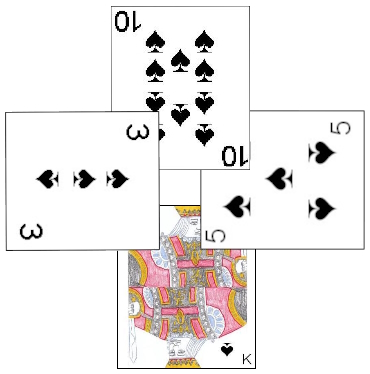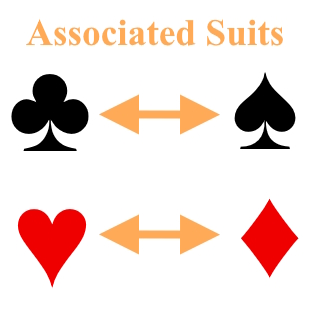Teka is a trick taking card game from Afghanistan, and is said to be the most popular social game played there. Teka is designed for play by four participants, playing in two partnerships consisting of two players each.
The deck used for the play of Teka is one standard 52 card deck. The ranking of the cards in this deck are as follows (from highest to lowest): Ace, King, Queen, Jack, 10, 9, 8, 7, 6, 5, 4, 3, 2.
Selection of partners for play of Teka can be performed in a variety of ways, with a common method being to have all four players draw one card from a shuffled deck. The player's drawing the two highest cards play as partners against the players drawing the two lowest. The player drawing the highest card of all has first selection of seats and is also set as the first dealer. The players should be seated at the table, in such a way that each player is directly across the table from his partner. After each hand, the role of dealer rotates around the table in a counter-clockwise direction.
The cards are only thoroughly shuffled before the first deal of a new game. After each hand during the same game, the cards are simply gathered together and cut by the dealer, and then offered to the player at the dealer's left for a second cut.
On each hand, the designated dealer for that hand will then begin dealing the cards. He starts with the player at his immediate right, dealing that player 13 total cards. He then similarly deals 13 cards to each other player at the table in a counter-clockwise direction. After each deal, if any player finds that he has no card in his hand higher than a ten may (but is not required to) request the cards be thrown in and a new hand dealt by the same dealer.
After the cards have been dealt, one round of bidding occurs. The player to the immediate right of the dealer has the first bid and the bidding continues in a counter-clockwise rotation, with each player getting exactly one opportunity to bid. The following are the legal bids in the game:
- Pass Bid: A player is never forced to bid on his turn to bid, and may simply pass. However, there are three different methods to make a pass bid, which, while still considered a pass, also attempt to convey some information to that player's partner who may not have yet bid on the current hand. The basic bid of "pass" indicates a passing bid in which the player does not believe they have a strong enough hand to bid the minimum of 8, but may still have some trick winning potential. A second pass type bid, "ter" is also considered a pass, with the bidder believing that the hand can win no or few tricks during the current hand. Lastly, a pass type bid of "behi ter" is a pass bid from a player having a very weak hand.
- Numbered Bid: This is a number of tricks that the player expects to win, from 8 (the minimum allowable bid) to 13. A bid of a higher number is considered a higher bid than a lower such number.
- Double 13: This is the highest allowable bid in Teka, and is a bid by the player to win every trick during the hand, playing solo (the bidding player's partner does not participate). Although this is considered the highest bid in the game, if a subsequent player also calls Double 13, the last player to thus make this call in turn, is considered the high bidder.
 |
| The player holding the Ace of spades must play an unbeatable card from the trump suit to the first trick. |
After the one round of bidding, whichever player has made the highest (and last) bid is considered the trump maker. This player thus declares one of the four suits as trump for that hand.
If the high bid is Double 13, the partner of the player making that bid must then set his cards aside out of play, and that player takes no further action in the current hand.
The high bidder also plays the first card to the first trick. On the very first trick of the hand, the leader must play a card from the declared trump suit to start the trick. Each other player than plays one card to that same trick in a counter-clockwise direction. On this first trick, whichever player has the Ace of the trump suit must, on his turn to play to that trick, play a card from the trump suit that cannot be beaten by any other player (such as playing the King of spades, if spades were trump and the player had the Ace and King of spades in hand). On subsequent tricks, the leader to a trick can play any card of choice still remaining in the hand.
After the lead to a trick, each other player in a counter-clockwise direction then plays one card to the same trick. If the player has a card of the same suit as originally led to the trick, they must play such a card. If the player has no cards in the suit originally led to the trick, the player may play any card from his hand, including a card from the declared trump suit.
After each player has played one card to the trick, it is determined which player won that trick. The trick is thus won by the player of the highest card in the trump suit played to that trick. If the trick contains no cards from the designated trump suit for that hand, the trick is won by the player of the highest card in the suit originally led to that trick. The cards won in tricks should be set aside and out of play for the remainder of that hand. The leader of each trick leads the first card to the next trick.
During play, the declarer may, at any time, announce that he wants to increase his initial bid to a higher numbered bid. If the opposing team agrees to the increase, this newly declared value now becomes the required number of tricks to be won by a player. If the opposing team refuses the bid increase, the bid stays at it's current value with no change. If, during the hand, the high bidding team wins the number of tricks bid, play immediately stops on that hand, with scoring to occur. Similarly, if the opponents win enough tricks during the hand to render the high bidders bid impossible to fulfill during the hand, play also immediately ceases on that hand.
After every trick has been played and won, scoring can then occur for the hand. If the high bidder's team manages to win the number of tricks bid, that team earns a number of points, added to their accumulated total score, equal to the amount of their high bid. If the high bidding team fails to win at least as many tricks as bid, the opposing team instead earns a total equal to the high bidders bid, multiplied by two. If the dealer was forced to make a bid, and bid the minimum of 8, that player would win 8 points is his team was successful, or loses 8 points of unsuccessful. A successful bid of Double 13 earns the high bidders team 26 points of fulfilled, or allows the opponents to score 52 if they do not win every trick during that hand.
The first team, over the course of several hands, manages to accumulate a total of 104 or more points is declared the winner.
 Although no secret signals are allowed, players are allowed to provide limited information to their partner based on the way they play their cards to the table, on their turn. The following are the recognized and allowed such signals used during a game of Teka:
Although no secret signals are allowed, players are allowed to provide limited information to their partner based on the way they play their cards to the table, on their turn. The following are the recognized and allowed such signals used during a game of Teka:
- Slamming your card to the table. If a player slams his card onto the table on his turn to play to the trick, he is indicating to his partner that he prefers that player lead a card of the same suit as the slammed card, at the next time that player has the lead.
- If in playing a card to the table, a player holds one side of the card, and lifts the other, and allows that lifted section to snap back onto the table, this is an indicator that the player want his partner, at his next opportunity to lead to a trick, to lead a card, not of the same suit of that card, but rather of the associated suit to the card currently being played. Thus, the suits of hearts and diamonds are associated suits, as are the suits of diamonds and clubs.
- If a player, on his turn to play to a trick, drops the card onto the trick and table from several inches above the table, this is an indicator that the player playing that card has no more cards of this suit.